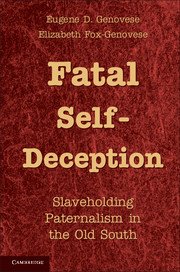5 - The Blacks’ Best and Most Faithful Friend
Published online by Cambridge University Press: 05 June 2012
Summary
The negro has never yet found a sincere friend but his master.
– George M. TroupGreater self-deception is hard to imagine than that displayed by Governor George M. Troup in his address to the Georgia legislature in 1824. Self-deception, not hypocrisy. Troup expressed a long-gestating and widespread conviction. As the slaves’ self-anointed friend, the master offered protection against the slaves’ incompetence and emotional fragility. Privately as well as publicly, Southerners insisted that the slave recognized his master as his “best and most faithful friend.” Proslavery northern public opinion helped. Southern newspapers relished and republished the frequent accounts from northern newspapers about the fine conditions and contentment of the slaves and about the urban misery of emancipated blacks who expressed a wish to be enslaved and return to the South. Beyond the principal newspapers of Richmond, Charleston, and New Orleans, small cities and towns reprinted directly from northern newspapers or from such southern newspapers as the Fayetteville Observer, Semi-Weekly Mississippian, Mobile Tribune, Daily Alabama Journal, Macon Daily Telegraph, Texas State Gazette, Arkansas Gazette, and Weekly Raleigh Register.
As the South moved toward secession, assertions of slaves’ loyalty and friendship grew louder, echoing long after the demise of slavery. They proceeded, especially among women, in tandem with notions of blacks’ racial inferiority and general incompetence. The Massachusetts-born Tryphena Fox, married to a Louisiana slaveholder, wrote to her mother in 1856, “Negroes are so slow that they put me out of patience, not doing in all day what a good white man would do in an hour.” A year later: “Talk about freeing negroes, some of them couldn't take care of themselves ten days.” Adelaide Stuart Dimitry of Mississippi cried that emancipation dissolved the bonds of kindness between master and slave, depriving blacks of their staunchest friends: “Poor black dupes.” Planters urged freedmen to stay with their old masters, since other whites cared nothing for them and would exploit them to the hilt. At the beginning of the War, Grace Brown Elmore of South Carolina asked, “Who but devils would seek to destroy the pleasant relations existing between Master & servant?” Elmore rated blacks the lowest of races: “What can the poor, uneducated, stupid, negro expect in the competition with white labor, which must sooner or later come?” And again: “The Negro as a hireling will never answer.” With emancipation, “His and the Master's interests are now separate and there is no bond but dollars and cents between them.” In 1895, Letitia A. Burwell of Virginia wrote, “Never again will the Negroes find a people so kind and true to them as the Southerners have been.”
- Type
- Chapter
- Information
- Fatal Self-DeceptionSlaveholding Paternalism in the Old South, pp. 89 - 110Publisher: Cambridge University PressPrint publication year: 2011



